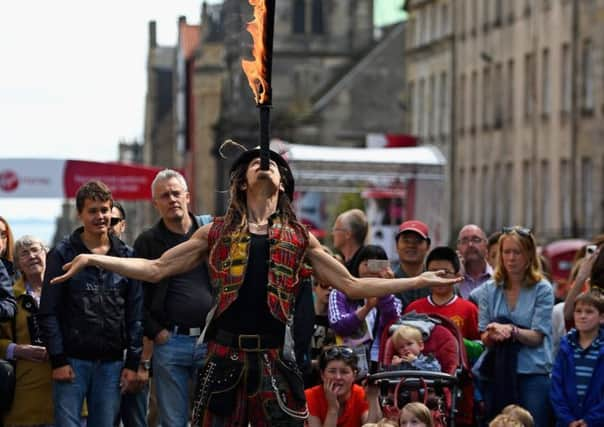Comment: Stop cramming culture into one mad month


I was playing devil’s advocate a bit, but there was a serious point. In spreading its major festivals throughout the year, Glasgow has created an entirely different cultural atmosphere to Edinburgh’s annual mix of feast and famine.
Anyone who works in the arts in Edinburgh will be familiar with that sinking feeling in September when the circus leaves town. There is no equivalent moment in Glasgow. This is not, I think, unconnected to the fact that its arts scene feels more stable and valued. Its artists and musicians stay in the city and become mentors for the next generation (at Glasgow School of Art, in particular). It is a city where things seem to get built (Trongate 103, the Riverside Museum, the Hydro) instead of just talked about (the Ross Bandstand, the “arts hotel” on Calton Hill, a new home for the Filmhouse) or worse, closed down (more music venues than I can bear to list). Yes, there are honourable exceptions.
Advertisement
Hide AdAdvertisement
Hide AdBut it is Edinburgh, not Glasgow, which is about to launch a project called Desire Lines, to explore the question “What makes Edinburgh a culturally successful city?” The answer to that, surely, is that if we don’t know by now, eight years after the Thundering Hooves report, then we have a serious problem.
Nonetheless, Desire Lines is a welcome development for three reasons. Firstly, its aspiration is to make changes from the grass-roots upward (a “desire line” is a route spontaneously created by pedestrians, often in defiance of town planners). Secondly, it will involve Edinburgh city council but has been initiated by arts organisations. Thirdly, it is interested in, and invested in, what happens in Edinburgh throughout the year, not just in August.
Step one is a (sold out) public meeting at Summerhall on Monday night. I predict that two subjects will come up a lot. The first is Edinburgh city council, which tends to get much of the blame for the city’s cultural failings. Some of this is deserved. The city’s strict rules on noise have crippled its music scene for years, and it is encouraging that this is now being addressed, and fascinating that the council wants to emulate the independent-spirited South by Southwest festival in Texas. That’s quite a turnaround from the way in which artists in general have often been treated – typified by the Bongo Club, a unique hothouse of grassroots activity, being ejected from its New Street home only for the site to remain exasperatingly derelict for more than a decade.
The second subject that will be much discussed on Monday is the Edinburgh festivals. There will be provocations to kick-start debate, so here’s one from me to start us off. The Edinburgh festivals, as a phenomenon, are psychologically damaging to the city. Instead of a vibrant, year-round culture, we have a brief, bloated, overwhelming spectacle. The festivals represent a dysfunctional culture in which, instead of coming to the city to live, work, inspire, and nurture, people in the arts come here to launch careers elsewhere, and those who do wish to make a life in the city are left feeling abandoned, ignored and bereft.
A new cultural policy for the city needs to do two core things, then: give audiences reasons to care for more than one month a year, and give the most talented people reasons to stay longer than one month a year.
A lot of the answers will have nothing to do with the festivals. The rethink of the city’s noise policy, for example, is hopefully indicative of a more empathetic approach to dealing with artists – like Douglas Robertson, whose hugely successful house gigs fell victim in 2012 to what he branded “the dead hand of the council”.
Desire Lines will need to find ways to establish that same empathetic approach elsewhere. Grand, expensive, architectural projects may make a splash, but we mostly need cheap, accessible, sustainable facilities, performance spaces that survive and thrive, and community engagement – all the things that build culture from the ground up.
Since festivals are what Edinburgh does best, though, here are some festival-related suggestions. Given that the Fringe is now so vast that it’s impossible to see even a fraction of what’s on offer, could it be split in two? There were more than 3,000 shows this year. What if there were 1,500 in August and 1,500 in July, an annual festival season that lasts the entire summer holidays – or from June onwards, including the Edinburgh International Film Festival? Or could the Fringe be split between July/August and December/January? Edinburgh’s Christmas is already dipping a toe in this icy water with a very Fringe-like programme, including Briefs, Al Murray, Frisky and Mannish and a circus show called Scotch and Soda. Could the Fringe revitalise January the way Celtic Connections has done for Glasgow? If so, perhaps the other festivals might want to start moving too. Would it lessen the impact of the main event? I don’t think so. Even a significantly reduced August programme would still be the biggest in the world. And it might give everyone some time and space to breathe. Discuss.
l Andrew Eaton-Lewis is a former group arts editor of The Scotsman and Scotland on Sunday.